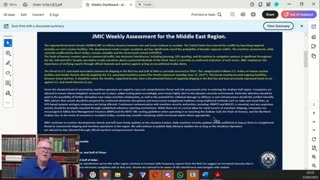Premium Only Content

Characteristics of a Narcissistic Government (Grandiose or Vulnerable)
A narcissistic government, whether grandiose or vulnerable, exhibits traits similar to those seen in individuals with narcissistic tendencies. Here are the key characteristics of both types of narcissistic governments:
1. Grandiose Narcissistic Government:
Excessive Focus on Image and Power: A grandiose narcissistic government is obsessed with projecting an image of strength, superiority, and infallibility. It often engages in propaganda that highlights its achievements, often exaggerating successes and suppressing failures.
Lack of Empathy: Policies may be made without consideration of how they affect the common people. The leadership tends to prioritize its own interests and the interests of a select elite group.
Need for Admiration: The government constantly seeks validation from its citizens and other countries. Leaders may use speeches, rallies, and media to demand praise and loyalty from the population.
Aggressive Response to Criticism: Any form of dissent or criticism is seen as a personal attack. Critics are often silenced, marginalized, or discredited through smear campaigns or legal persecution.
Centralization of Power: Power is concentrated in a small group or even a single leader, often disregarding democratic checks and balances. Decision-making is highly controlled, and transparency is limited.
Grandiose Vision: The leadership may present overly ambitious or unrealistic plans, often framing itself as the savior of the nation or as having a historic mission. There is often a focus on nationalist or expansionist ideologies.
Example Behaviors:
Suppressing opposition parties or the media.
Constantly boasting about achievements while denying or hiding failures.
Portraying the government as essential to the nation's identity or future.
2. Vulnerable Narcissistic Government:
Insecurity and Victim Mentality: A vulnerable narcissistic government is hypersensitive to criticism and often frames itself as being under constant attack, both from internal and external "enemies." It may use this perceived victimization to justify aggressive policies or actions.
Blame-Shifting: The government tends to blame others (e.g., past governments, foreign powers, or internal minorities) for its own failings. It rarely takes responsibility for problems, even when they are a direct result of its policies.
Emotional Manipulation: The leadership often appeals to the emotions of its citizens, using fear, anger, or sympathy to maintain control. They may portray themselves as misunderstood or the only ones who truly care for the nation's future.
Inconsistent Policies: Due to its insecurity, this type of government may frequently change direction, policies, or alliances, driven more by its perceived emotional needs than by pragmatic concerns.
Passive-Aggressive Behavior: Instead of direct confrontation, a vulnerable narcissistic government may engage in passive-aggressive tactics, such as withholding information, making veiled threats, or quietly undermining opposition.
Overreaction to Perceived Slights: Like vulnerable individuals, this government can overreact to even mild criticism, leading to disproportionate or irrational responses.
Example Behaviors:
Constantly shifting blame for economic problems onto foreign countries or past administrations.
Playing the victim of global conspiracies or internal sabotage.
Frequently using emotional appeals to the population, such as claiming the government is the only protector of the people’s interests.
Asking the Public:
Do you think the government you live under exhibits traits of narcissism?
Do they seek constant validation and admiration?
Do they suppress criticism and dissent, framing it as personal attacks?
Do they blame others for their own shortcomings?
Do they make unrealistic promises or project themselves as the sole solution to the nation’s problems?
Do they engage in emotional manipulation, using fear or anger to maintain control?
Consider the actions and behaviors of your government, and reflect on whether they align with the traits of a grandiose or vulnerable narcissistic leadership.
-
 2:00:04
2:00:04
The Full English Show
10 days agoI have some weird but honest views on Trump bombing Iran.
2.96K30 -
 3:08:11
3:08:11
Price of Reason
12 hours agoCongress PASSES Trump OBBB! Jurassic World Rebirth Review! Boxer Julio Cesar Chavez Jr. DEPORTED?
16.8K9 -
 33:33
33:33
Solar Groove Muzic
1 day ago $10.49 earnedDeep House Mix 2025 | Best Vocal House Music
38.5K17 -

MyronGainesX
21 hours ago $11.01 earnedFormer Fed Explains Why Diddy Beat The Feds! Democrats CRY Over The Big Beautiful Bill
45.2K24 -
 9:11:35
9:11:35
SpartakusLIVE
11 hours agoSHAVING my BEARD on stream TONIGHT || Chiseled JAWLINE, peak MASCULINITY, and SUAVE FRESH FACE
74.8K1 -
 2:43:56
2:43:56
Barry Cunningham
12 hours agoBREAKING: PRESIDENT TRUMP SPEAKS AT AMERICA'S 250TH ANNIVERSARY KICK-OFF RALLY!
67K46 -
 LIVE
LIVE
Repentency
7 hours agoHalo 2 HCS Pro Playing Matchmaking
460 watching -
 4:03:42
4:03:42
Alex Zedra
8 hours agoLIVE! CoD tonight :D
23K2 -
 1:31:19
1:31:19
AimControllers
3 days ago $16.17 earned🔴LIVE - THE PRE GAME LOBBY PODCAST
66K10 -
 2:17:32
2:17:32
megimu32
9 hours agoOTS: Born to Grill, Raised on Fireworks - 4th of July Throwbacks
37.1K17